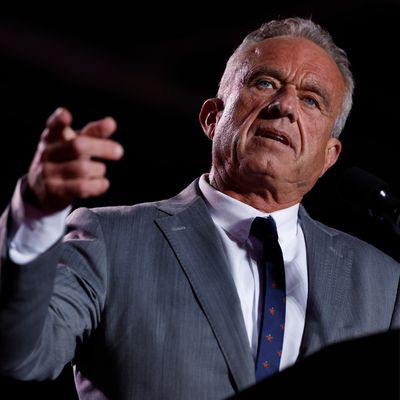
Among Donald Trump’s controversial Cabinet picks for his second presidential administration, his choice of Robert F. Kennedy Jr. for Health and Human Services secretary is undoubtedly one of the most worrisome and potentially consequential. Kennedy, who has vowed to “Make America Healthy Again,” is an infamous proponent of various alternative views about public health and food and drug safety, a well-known vaccine skeptic, a purveyor of numerous debunked conspiracy theories, and a hostile longtime critic of the agencies he would oversee if confirmed by the Senate. Below is a running list of what he’s planning, and what he can and can’t do, as HHS secretary.
.
Kennedy says he’s “not going to take away anybody’s vaccines,” but it doesn’t end there
Neither Kennedy nor Trump has the power to ban FDA-approved vaccines outright, neither has said they would, and it’s likely that any effort to do so would face significant legal challenges, and that the Supreme Court would be skeptical of any politically motivated efforts to overturn a science-based FDA vaccine approval. RFK Jr. has repeatedly said that he isn’t planning to ban vaccines — repeating the day after the election that “I’m not going to take away anybody’s vaccines” — but there are many other ways the former anti-vaxx movement leader can, as HHS secretary, cast doubt on them and reduce their use.
Furthermore, there are anti-vaccine activists assisting Kennedy as informal advisers in his transition efforts, according to Politico. Trump’s new pick for FDA commissioner, Martin Makary, is a Kennedy ally and Fox News contributor who opposed COVID-vaccine mandates (though he didn’t oppose the COVID vaccines). He is also a longtime critic of the FDA. Trump’s pick for CDC director, former Florida congressman Dave Weldon, is, like Kennedy, a veteran of the anti-vaxx movement who has promoted the debunked theory linking childhood vaccines to autism. In Congress, Weldon tried and failed to transfer vaccine safety oversight from the CDC to an new independent agency. The Washington Post reports that both Weldon and Makary were recommended by Kennedy’s advisors.
.
Reexamine (and possibly discredit) vaccine safety and effectiveness
Kennedy has said he plans to take a hard look at the safety and efficacy of existing vaccines with the aim of arming the public with better information and transparency. “I’m going to make sure scientific safety studies and efficacy are out there, and people can make individual assessments about whether that product is going to be good for them.” One way he might do that is to order new studies of existing federal health data regarding vaccine safety. If that work is selectively done by vaccine skeptics in service of a pre-existing conclusion, it won’t be credible and could be misleading if not dangerous.
.
Change or limit federal vaccine guidance and approval
Kennedy could instruct the CDC director to disband the Advisory Committee on Immunization Practices, or re-staff it with vaccine skeptics, effectively ending or subverting federal vaccine guidance. They could limit access to vaccines by changing the recommendations for which routine vaccines health insurers are required to cover. They could also limit or distort the information available to medical professionals and the public about vaccines.
RFK Jr. would also have the power, along with the FDA commissioner, to slow down or hamper the process by which new vaccines are evaluated, approved, and recommended. That could discourage pharmaceutical companies from developing new or reformulated vaccines.
.
Limit or eliminate the CDC’s Vaccines for Children program
Kennedy could work to cut or wholly eliminate funding for the program, which provides free vaccines to Medicaid-eligible, uninsured, and underinsured children.
.
Suspend NIH drug development and infectious-disease research
During a town hall in June, RFK Jr. said that if he was elected president, he would order the NIH to pause its funding of drug development and infectious-disease research for eight years. It’s not clear if he still plans to pursue that plan of action as HHS secretary, but he has called for firing and replacing hundreds of career employees at the agency. He has also called for ending federally funded “gain of function” infectious-disease research.
.
Use half of NIH research budget to study alternative medicine
In a Wall Street Journal op-ed in September, Kennedy wrote that he wanted to “devote half of research budgets from the NIH toward preventive, alternative and holistic approaches to health” arguing that “researchers don’t have enough incentive to study generic drugs and root-cause therapies that look at things like diet.”
.
Bar NIH funding for “researchers with conflicts of interest”
Kennedy said in a September Wall Street Journal op-ed that “a 2019 ProPublica analysis of disclosures going back to 2012 found that over 8,000 federally funded health researchers reported significant financial conflicts of interest.” As ProPublica reported:
These outside interests range from stock holdings in companies that may benefit from the outcome of research to payments for royalties, consulting work and speaking engagements. The total value of the conflicts is likely much higher than $188 million, in part because 44% of the disclosures did not place a dollar value on the investigator’s financial relationship.
The NIH requires disclosures of “significant” financial conflicts — valued at more than $5,000 a year — because outside income from interested parties can potentially affect researchers’ objectivity and influence the design and findings of their taxpayer-subsidized work.
.
Fire career staff and eliminate “entire departments” at the FDA
Kennedy has vowed to make some big changes at the agency, which employs some 18,000 scientists, researchers, and inspectors. In late October, Kennedy vowed that the “FDA’s war on public health is about to end” and warned that, “If you work for the FDA and are part of this corrupt system, I have two messages for you: 1. Preserve your records, and 2. Pack your bags.”
As HHS secretary, Kennedy has the authority, working with the FDA commissioner, to reorganize the agency without congressional approval. He says he wants to fully eliminate “entire departments” at the FDA, listing as a top target the Center for Food Safety and Applied Nutrition, which he says can’t be trusted to do its job.
.
Limit or ban direct-to-consumer pharmaceutical advertising
RFK Jr. has long been opposed to pharmaceutical ads, particularly on television, where drugmakers spend billions of dollars a year on marketing. As HHS secretary, he would be in a position to direct the FDA to review and revise its guidelines regarding drug advertising. New FDA rules went into effect on November 20 requiring pharmaceutical companies to more clearly and directly inform consumers of medication risks and side effects in their TV ads, and there have been calls for the FDA to rein in the growing trend of pharmaceutical ads on social media, as well. Kennedy wants to ban direct-to-consumer pharma ads entirely, highlighting how the U.S. and New Zealand are the only two countries that allow them. As Digiday points out, such a ban would likely face significant legal hurdles.
.
Encourage state and local authorities to stop adding fluoride to drinking water
Kennedy announced, and Trump later sort of confirmed, that the White House would advise against the addition of fluoride to water supplies, which would likely include rescinding the CDC’s recommendation on the matter. The agency currently calls water fluoridation “one of ten great public health interventions of the 20th century because of the dramatic decline in cavities since community water fluoridation started in 1945.”
Kennedy has made wildly exaggerated claims about the health risks linked to fluoride, which is widely considered a safe and effective public-health intervention, but his ability to change the policies of state and local water authorities is limited. The federal government can only offer advice, not ban those authorities from adding fluoride. However, the federal shift could clear the way for some GOP-led states to abandon the practice. On November 22, Florida surgeon general Joseph Ladapo advised local water authorities in the state to cease water fluoridation, becoming the first state health leader to publicly oppose the practice.
.
Restrict or ban a number of food additives
Kennedy has long advocated against various food additives, including artificial food dyes, various chemicals, and seed oils — arguing that they are harmful to the people’s health. He and his allies may try to rewrite FDA “GRAS” regulations regarding additives and prevent companies from being able to self-certify the safety of their food ingredients (it’s worth noting that many experts seem to agree that FDA regulations are in need of reform in this area).
Kennedy has made some questionable, exaggerated, and false claims about food safety and nutrition, but some of his views on the matter are also shared by food scientists, consumer advocates, and legislators. Last year, California banned four food additives linked to serious health problems: red dye No. 3, potassium bromate, brominated vegetable oil, and propylparaben. In July, the FDA banned brominated vegetable oil in food, effective August 2025.
.
Increase access to raw milk
Kennedy is a loud and proud drinker of raw milk, which is milk that hasn’t been pasteurized to eliminate pathogens. Kennedy says that consuming raw milk “advances human health” and he has accused the FDA of “aggressive suppression” of raw milk and many other products. Many states allow either retail or on-farm sale of raw milk; the FDA bans the sale of raw milk across state lines.
Unpasteurized raw milk can contain harmful bacteria like E. coli, salmonella, listeria, and campylobacter, which can trigger foodborne illnesses that are especially dangerous for children, seniors, pregnant women, and the immunocompromised. The CDC is also monitoring whether or not the H5N1 bird flu can be transmitted from infected dairy cows to humans via raw milk, while California authorities have detected the virus in store-bought raw milk, prompting a recall. And the supposed health benefits of raw milk over pasteurized milk are not backed up by evidence, according to most food scientists.
.
Increase access to a long list of other products
Kennedy posted on X in late October that the “FDA’s war on public health is about to end” and cited its “suppression” of:
psychedelics, peptides, stem cells, raw milk, hyperbaric therapies, chelating compounds, ivermectin, hydroxychloroquine, vitamins, clean foods, sunshine, exercise, nutraceuticals and anything else that advances human health and can’t be patented by Pharma.
It’s not clear exactly how he’ll end the suppression of these things.
.
Attempt to overhaul Medicare’s payment formula
According to Stat News and the Washington Post, Kennedy and his team are discussing plans to upend Medicare’s payment formula, which is used to determine how much physicians are paid by the federal health-insurance system. That formula is currently based on the recommendations of the American Medical Association physician lobbying group, which means doctors are effectively setting their own prices. This dynamic has attracted bipartisan criticism. Per the Post:
The discussions are in their early stages, the people said, and have involved a plan to review the thousands of billing codes that determine how much physicians get paid for performing procedures and services. The coding system tends to reward health-care providers for surgeries and other costly procedures. It has been accused of steering physicians to become specialists because they will be paid more, while financial incentives are different in other countries, where more physicians go into primary care — and health outcomes are better. Although policymakers have spent years warning about Medicare’s billing codes and their skewed incentives, the matter has received little national attention given the challenge of explaining the complex issues to the public, the technicalities of billing codes and the financial interests for industry groups accustomed to how payments are set.
This post has been updated.






























